[Interview] Beyond K-Dramas: Dr. Lee’s Perspective on Korean Language Learning in India’s Northeast
2024-12-31The growing interest in Korean culture has sparked an increasing demand for Korean language education around the world, particularly in India’s Northeast. Professor Hyunkyung Lee, a visiting professor at Manipur University, has been at the forefront of this cultural exchange, teaching the Korean language and literature. With a specialization in teaching Korean as a foreign language and comparative linguistics, Professor Lee brings a unique perspective to her teaching methods, shaped by her diverse experience and the enthusiastic students she works with in Manipur. In this exclusive interview, we delve into Professor Lee’s journey, the impact of the Korean Wave (Hallyu) on language learning, and her thoughts on the future of Korean studies in India.
Questions: Dr. Lee, you have been actively involved in Korean language education in India, particularly in the Northeast region. What motivated you to work as a visiting professor in India, particularly at Manipur University, and your journey so far as a visiting professor?
Professor Lee: Sure. Hello, my name is Hyunkyung Lee, and I am currently a professor at Manipur University, where I teach the Korean language under the Korean Foundation. My journey in the field of Korean language education began in 2008. I have had the opportunity to teach at various institutions and also worked as a guest lecturer and visiting professor at several universities, including in South Korea. My path to India started when I met Dr. Romita, an Assistant Professor at Manipur University, during a visit to Delhi University for Asian Studies. She invited me to deliver special lectures at Manipur University, which led to further discussions with the Korean embassy. This eventually resulted in my decision to move to Manipur with my family. I found it to be an ideal location for both personal and professional reasons, especially for my youngest son.
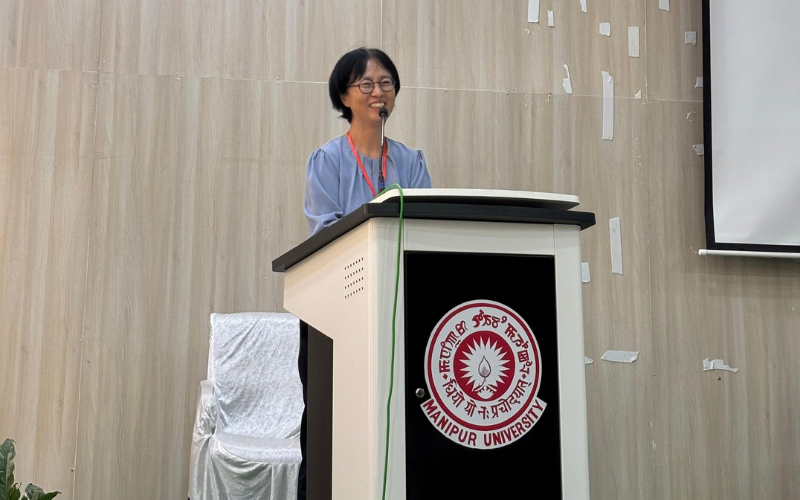
Questions: Why did you particularly choose Manipur in India? How has the local culture or the students' enthusiasm influenced your teaching methods or perspective?
Professor Lee: Manipur is an incredibly beautiful place, and the enthusiasm of the students here was truly captivating. The local culture and their interest in Korean culture, such as K-dramas, K-pop, and Korean cuisine, significantly influenced my decision to settle here. The students' enthusiasm has shaped my teaching approach, and I’ve adapted my methods to align with their cultural context. The diversity and passion of the students have made my teaching experience very fulfilling. I try to integrate the local context into my curriculum by focusing on practical exercises and comparative linguistic studies.
Questions: Can you talk about the impact of local culture on your teaching methods and curriculum?
Professor Lee: The students in Manipur are very enthusiastic, and this local interest in Korean culture has shaped my approach. I have made changes to the curriculum to ensure it resonates with their cultural context. For instance, I incorporate comparative studies between Indian languages and Korean, helping students understand differences in pronunciation and grammar. This helps them bridge the gap between their native languages and Korean. I also use technology, such as software programs to measure pronunciation, making the learning process more effective.
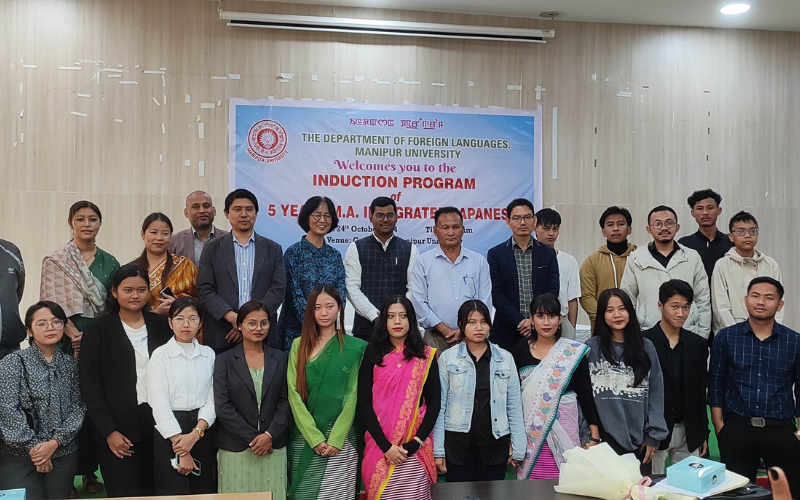
Questions: You have conducted a workshop titled "Korean Wave and Korean Language Learning in North-East India" at Manipur University. What are the key takeaways from this event regarding the popularity of Korean culture in the region?
Professor Lee: The workshop highlighted how deeply the Korean Wave has penetrated the region, particularly through K-pop, K-dramas, and Korean food. The students were already quite familiar with many aspects of Korean culture, which made learning the language more engaging for them. I also realized that there’s a growing interest in learning the language for professional growth, beyond just a hobby. The event demonstrated that Korean culture is not just a trend but a meaningful cultural exchange that sparks curiosity and motivates students to study the language.
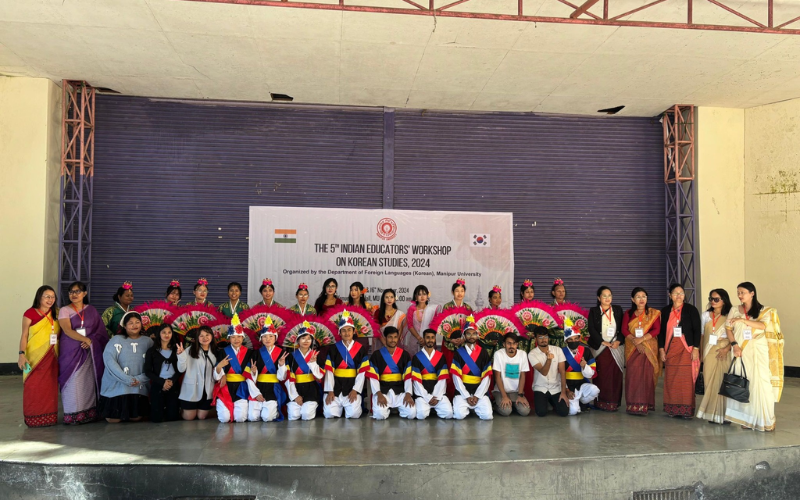
Questions: How do you think the Korean Wave (Hallyu) influences students' interest in learning the Korean language?
Professor Lee: The Korean Wave has had a tremendous impact on students’ motivation to learn Korean. Many students are already familiar with Korean culture through K-pop and K-dramas, which provides them with a strong foundation for learning the language. This familiarity helps them connect with the language more easily, and their enthusiasm for Korean culture drives their interest in deeper studies. However, I always encourage them to view the language as a professional skill rather than just a cultural interest.
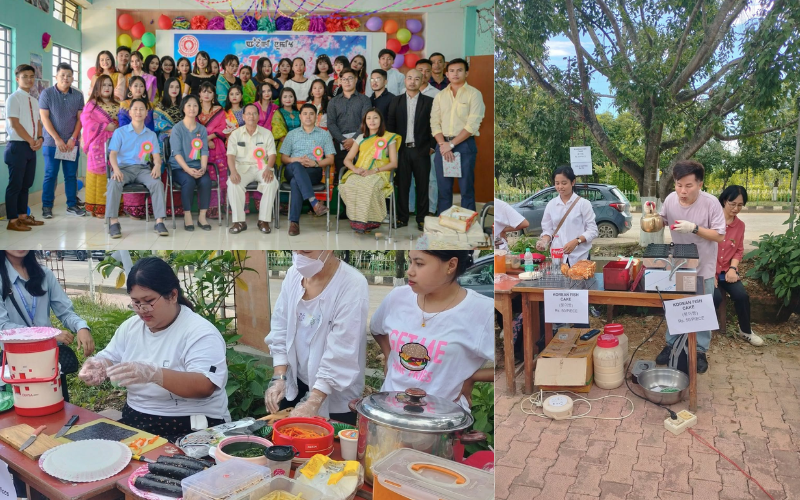
Questions: What are the unique challenges of teaching Korean in a multicultural and multilingual country like India? Could you share some memorable experiences from your time teaching at Manipur University?
Professor Lee: Teaching in a multicultural and multilingual environment like India presents a unique set of challenges, especially when it comes to pronunciation and grammar. Students come from diverse linguistic backgrounds, and the differences in pronunciation can make it difficult to teach them accurate Korean phonetics. For example, students from Hindi-speaking regions often have a high-pitched intonation, which doesn’t align with Korean pronunciation. To overcome this, I use practical exercises and comparative studies between Indian languages and Korean to help students bridge the gap. One memorable experience was seeing how quickly students adapted when we incorporated more interactive learning tools like language software.
Questions: In your publications, have you found any interesting parallels between Korean and Indian linguistic traditions?
Professor Lee: Yes, there are some interesting parallels, especially in the syntax and structure of certain sentences. However, there are also key differences in phonetics and intonation. Indian languages like Hindi or Bengali have a distinct phonetic system that is quite different from Korean. But by highlighting these differences, we can help students better understand the unique aspects of Korean pronunciation, making it easier for them to learn.
Questions: As an expert in comparative linguistics, how do you use this knowledge to teach Korean to Indian students? Can you share an example of how understanding the similarities and differences between the languages helps students learn better?
Professor Lee: I use my knowledge of comparative linguistics to help students understand the nuances of Korean pronunciation and grammar by comparing it with their native languages. For instance, I teach students how Korean’s subject-object-verb (SOV) sentence structure is similar to many Indian languages, but the intonation patterns differ significantly. This approach helps students grasp difficult concepts more easily. I also use technology, such as language software programs, to help measure pronunciation and ensure that students can make the necessary adjustments.
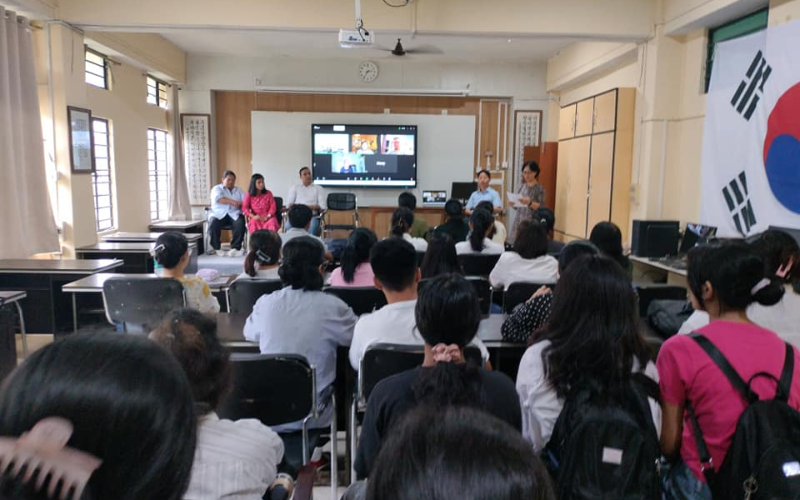
Questions: With the increasing popularity of Korean language courses in India, where do you see the future of Korean studies heading in the next five years? Do you anticipate any significant changes or new trends, especially in light of the recent educational policies?
Professor Lee: I see a very promising future for Korean studies in India. There is a growing interest in the Korean language, and more universities are offering Korean language courses. In the next five years, I expect to see an expansion of these programs, with more scholarships and academic exchange opportunities between India and Korea. Educational policies are evolving to accommodate this trend, which will likely result in more structured and formalized language programs, offering greater professional opportunities for students.
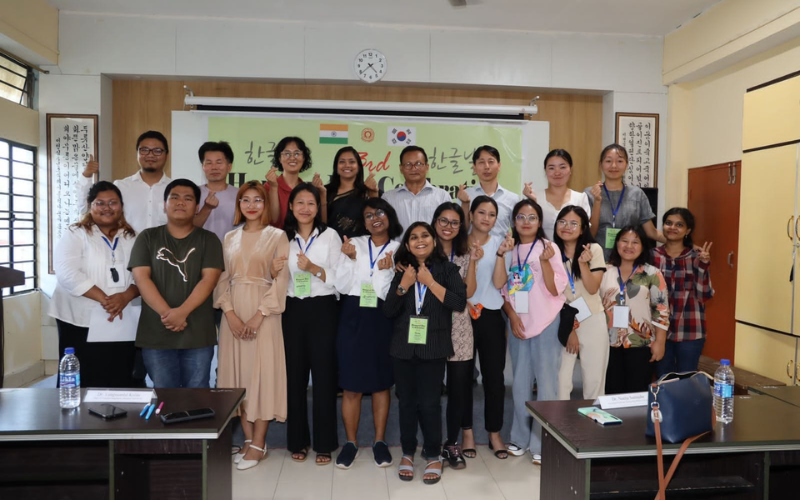
Questions: As someone admired for your energy and helpful nature, what personal philosophies or practices do you follow to maintain such a positive outlook?
Professor Lee: My personal philosophy revolves around adaptability, patience, and responsibility. Teaching in a foreign country has taught me the importance of being open-minded and adaptable to different cultural contexts. I try to maintain a positive outlook by focusing on the progress my students make and finding joy in their successes. I also practice mindfulness, which helps me stay grounded and maintain my energy.
Questions: How do you think the academic exchange between Korea and India could be enhanced further?
Professor Lee: Strengthening academic exchanges is crucial for the future of Korean studies in India. I believe there should be more scholarships and partnership programs between Indian and Korean universities. This could also extend to internship opportunities with Korean companies and cultural exchange programs. These initiatives would not only provide educational growth but also foster stronger cultural ties between the two countries.
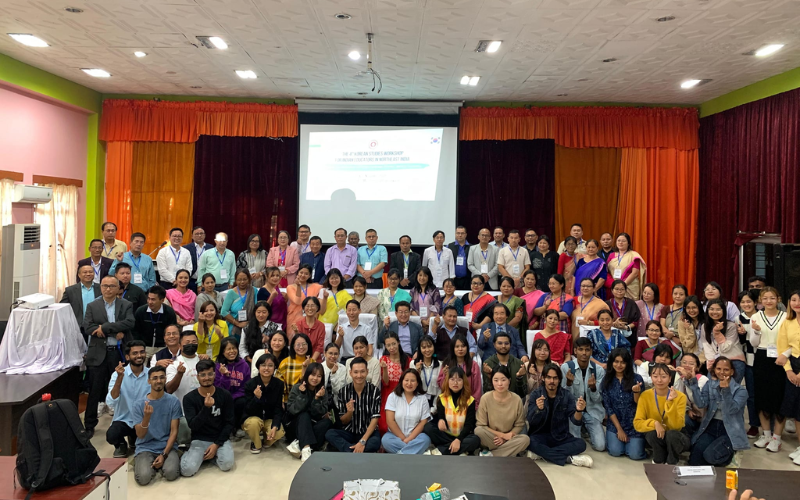
Questions: What advice would you give to young linguists or cultural scholars looking to pursue a career similar to yours?
Professor Lee: My advice to young scholars is to stay curious and open to new experiences. Linguistics is not just about language; it’s about understanding culture, history, and identity. I would also recommend pursuing interdisciplinary studies—translation, interpretation, or even Korean literature—as these fields complement each other. Finally, I would encourage them to seize opportunities for exchange programs and certifications that can further their careers. Most importantly, remember that teaching and learning languages is about building bridges between people and cultures.
Questions: Finally, any personal reflections on your journey as an educator?
Professor Lee: My journey has been fulfilling, though not without its challenges. Teaching in a foreign country requires patience, adaptability, and a deep sense of responsibility. I’m proud of the progress we’ve made in Korean studies in India, especially in Manipur. It’s rewarding to see students embrace Korean culture and language in their unique ways. I look forward to continuing this journey and contributing further to the academic growth of Korean studies in India.
Conclusion:
Professor Hyunkyung Lee’s work in teaching Korean at Manipur University highlights the growing impact of Korean culture in India’s Northeast. Her efforts in blending local context with Korean studies reflect the increasing academic interest in the language. As Korean language programs expand in India, the exchange between Korea and India promises to strengthen cultural ties and foster deeper global understanding.
How about this article?
- Like4
- Support0
- Amazing3
- Sad0
- Curious0
- Insightful0


